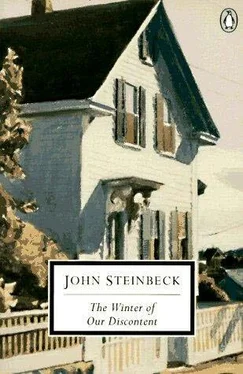John Steinbeck - The Winter of Our Discontent
Здесь есть возможность читать онлайн «John Steinbeck - The Winter of Our Discontent» весь текст электронной книги совершенно бесплатно (целиком полную версию без сокращений). В некоторых случаях можно слушать аудио, скачать через торрент в формате fb2 и присутствует краткое содержание. Жанр: Классическая проза, на английском языке. Описание произведения, (предисловие) а так же отзывы посетителей доступны на портале библиотеки ЛибКат.
- Название:The Winter of Our Discontent
- Автор:
- Жанр:
- Год:неизвестен
- ISBN:нет данных
- Рейтинг книги:5 / 5. Голосов: 1
-
Избранное:Добавить в избранное
- Отзывы:
-
Ваша оценка:
- 100
- 1
- 2
- 3
- 4
- 5
The Winter of Our Discontent: краткое содержание, описание и аннотация
Предлагаем к чтению аннотацию, описание, краткое содержание или предисловие (зависит от того, что написал сам автор книги «The Winter of Our Discontent»). Если вы не нашли необходимую информацию о книге — напишите в комментариях, мы постараемся отыскать её.
The Winter of Our Discontent — читать онлайн бесплатно полную книгу (весь текст) целиком
Ниже представлен текст книги, разбитый по страницам. Система сохранения места последней прочитанной страницы, позволяет с удобством читать онлайн бесплатно книгу «The Winter of Our Discontent», без необходимости каждый раз заново искать на чём Вы остановились. Поставьте закладку, и сможете в любой момент перейти на страницу, на которой закончили чтение.
Интервал:
Закладка:
“On rye—lettuce and mayonnaise.”
A little light, grayed by the dusty iron-barred window, came into the storeroom from the narrow alley. Ethan paused in the twilight place shelved to the ceiling and stacked with the cartons and wooden cases of canned fruits, vegetables, fish, processed meats, and cheese. He sniffed for mice among the seminal smells of flour and dried beans and peas, the paper-and-ink odor of boxed cereals, thick rich sourness of cheeses, and sausage, reek of hams and bacon, ferment of cabbage trimmings, lettuce, and beet tops from the silvery garbage cans beside the back door. Perceiving no rusty must of mouse, he opened the alley door again and rolled the covered garbage cans into the alley. A gray cat darted to get in, but he drove it away.
“No you don’t,” he remarked to the cat. “Mice and rats are feed for cats, but you’re a sausage nibbler. Aroint! [4] Aroint!: Term of dismissal, “begone.” “Aroint thee, witch,” from Shakespeare’s Macbeth. “Aroint” is inscribed in a cement slab outside Steinbeck’s Sag Harbor retreat, an octagonal writing house he called “Joyous Garde.”
You hear me—aroint!” The seated cat was licking a curled pink paw but at the second “aroint” he hightailed away and scrambled over the board fence behind the bank. “That must be a magic word,” Ethan said aloud. He returned to the storeroom and closed the door after him.
Now through the dusty room to the swinging door of the grocery—but at the cubicle of the toilet he heard the whispering of seeping water. He opened the plywood door, switched on the light, and flushed the toilet. Then he pushed open the wide door with wire-netted glass peekhole and wedged it open, kicking the wood block firmly in with his toe.
The store was greeny from the drawn shades over the big front windows. Again shelves to the ceiling, filled neatly with gleaming canned and glassed foods, a library for the stomach. On one side—counter, cash register, bags, string, and that glory in stainless steel and white enamel, the cold cabinet, in which the compressor whispered to itself. Ethan flipped a switch and flooded the cold cuts, cheeses, sausage, chops, steaks, and fish with a cold bluish neon glare. A reflected cathedral light filled the store, a diffused cathedral light like that of Chartres. Ethan paused to admire it, the organ pipes of canned tomatoes, the chapels of mustard and olives, the hundred oval tombs of sardines.
“Unimum et unimorum,” [5] Unimum et… : Joseph Fontenrose, classical scholar, says Ethan chants “counterfeit Latin… in something like the Black Mass.” To translate Malory, Steinbeck wrote to a California friend that he had to “reactivate my limping Latin, Anglo-Saxon and old French.”
he intoned in a nasal litanic tone. “Uni unimouse quod unibug in omnem unim, domine—ahhhhhmen,” he sang. And he could hear his wife commenting, “That’s silly and besides it might hurt somebody’s feelings. You can’t go around hurting feelings.”
A clerk in a grocery store—Marullo’s grocery store—a man with a wife and two darling children. When is he alone, when can he be alone? Customers in the daytime, wife and kiddies in the evening; wife at night, customers in the daytime, wife and kiddies in the evening. “Bathroom—that’s when,” Ethan said loudly, and right now, before I open the sluice. Oh! the dusky, musky, smelly-welly, silly-billy time—the slovenly-lovely time. “Now whose feelings can I hurt, sugarfoot?” he said to his wife. “There ain’t nobody nor nobody’s feelings here. Just me and my unimum unimorum until—until I open that goddam front door.”
From a drawer behind the counter by the cash register he took a clean apron and unfolded it and straightened the tapes, put it around his thin middle, brought the tapes around and back again. He reached behind his back with both hands and fumbled a bowknot.
The apron was long, halfway down his shins. He raised his right hand, cupped loosely, palm upward, and he declaimed, “Hear me O ye canned pears, ye pickles and ye piccalilli—‘As soon as it was day, [6] As soon as it was day… : Luke 22:66-23:31.
the elders of the people and the chief priests and the scribes came together and led Him into their council—’ as soon as it was day. The buggers went to work early, didn’t they? They didn’t waste no time nohow. Let’s see now. ‘And it was about the sixth hour’—that’s maybe twelve o’clock—‘and there was a darkness over all the earth until the ninth hour. And the sun was darkened.’ Now how do I remember that? Good God, it took Him a long time to die—a dreadful long time.” He dropped his hand and looked wondering at the crowded shelves as though they might answer him. “You don’t speak to me now, Mary, my dumpling. Are you one of the Daughters of Jerusalem? ‘Weep not for me,’ He said. ‘Weep for yourselves and for your children.... For if they do these things in a green tree, what shall be done in the dry?’ Still breaks me up. Aunt Deborah wrought better than she knew. It’s not the sixth hour yet—not yet.”
He raised the green shades on the big windows, saying, “Come in, day!” And then he unlocked the front doors. “Enter, world.” He swung the iron-barred doors open and latched them open. And the morning sun lay softly on the pavement as it should, for in April the sun arose right where the High Street ran into the bay. Ethan went back to the toilet for a broom to sweep the sidewalk.
A day, a livelong day, is not one thing but many. It changes not only in growing light toward zenith and decline again, but in texture and mood, in tone and meaning, warped by a thousand factors of season, of heat or cold, of still or multi winds, torqued by odors, tastes, and the fabrics of ice or grass, of bud or leaf or black-drawn naked limbs. And as a day changes so do its subjects, bugs and birds, cats, dogs, butterflies and people.
Ethan Allen Hawley’s quiet, dim, and inward day was done. The man who swept the morning pavement with metronomic strokes was not the man who could sermonize to canned goods, not a unimum unimorum man, not even a silly-billy man. He gathered cigarette ends and gum wrappers, bud cases from the pollenizing trees, and simple plain dust in the sweep of his broom and moved the windrow of derelict toward the gutter, to await the town men with their silver truck.
Mr. Baker took his measured decent way from his house on Maple Street toward the red brick basilica of a First National Bank. And if his steps were not of equal length, who was to know that out of ancient habit he avoided breaking his mother’s back?
“Good morning, Mr. Baker,” Ethan said and held his stroke to save the banker’s neat serge pants from dust.
“Morning, Ethan. Fine morning.”
“Fine,” said Ethan. “Spring’s in, Mr. Baker. Groundhog was right again.”
“He was, he was.” Mr. Baker paused. “I’ve been wanting to talk to you, Ethan. That money your wife got by her brother’s will—over five thousand, isn’t it?”
“Sixty-five hundred after taxes,” Ethan said.
“Well, it’s just lying in the bank. Ought to be invested. Like to talk to you about that. Your money should be working.”
“Sixty-five hundred dollars can’t do much work, sir. It can only stand by for emergencies.”
“I’m not a believer in idle money, Ethan.”
“Well, this also serves—just standing and waiting.” [7] Well, this also serves… : The final line of “On His Blindness,” a sonnet by John Milton, is “They also serve who only stand and wait.”
The banker’s voice became frosty. “I don’t understand.” His inflection said he did understand and found it stupid, and his tone twisted a bitterness in Ethan, and the bitterness spawned a lie.
Читать дальшеИнтервал:
Закладка:
Похожие книги на «The Winter of Our Discontent»
Представляем Вашему вниманию похожие книги на «The Winter of Our Discontent» списком для выбора. Мы отобрали схожую по названию и смыслу литературу в надежде предоставить читателям больше вариантов отыскать новые, интересные, ещё непрочитанные произведения.
Обсуждение, отзывы о книге «The Winter of Our Discontent» и просто собственные мнения читателей. Оставьте ваши комментарии, напишите, что Вы думаете о произведении, его смысле или главных героях. Укажите что конкретно понравилось, а что нет, и почему Вы так считаете.











